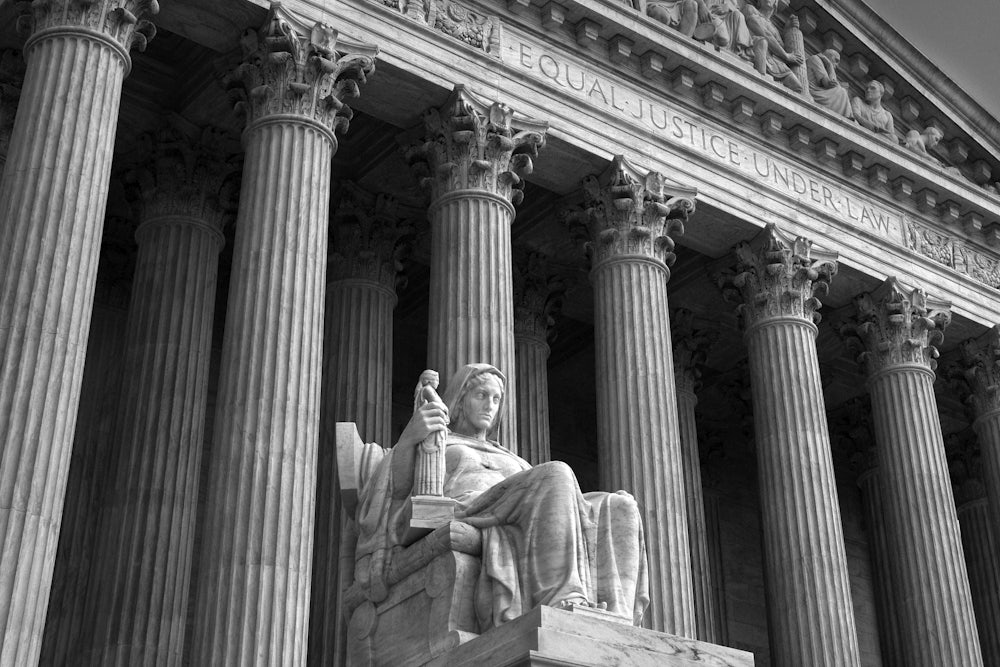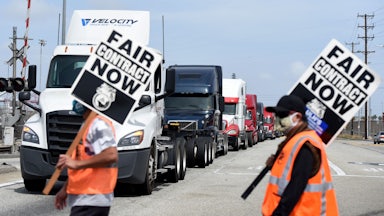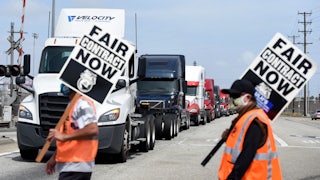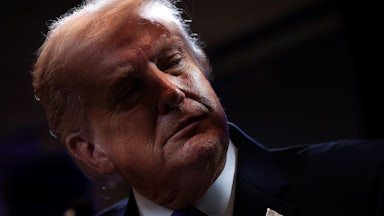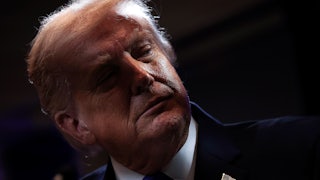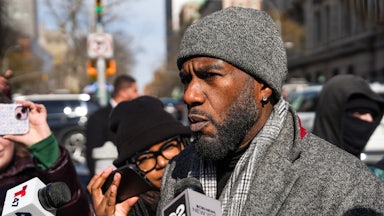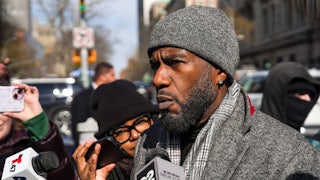The Supreme Court’s conservative majority typically sides with capital over labor. A 2015 analysis found that business interests won 20 percent more cases during the Roberts court’s first 10 years than they did in the three decades before that. That trend could be disrupted—however so briefly—later this term by a case that pits businesses against one of the few issues that this court favors more highly: religious freedom.
In their Friday orders last week, the justices announced that they would take up eight new cases for this term. One of them, Groff v. DeJoy, revisits an issue that some of the court’s conservatives have urged it to consider in recent years: whether the court’s precedents on workplace discrimination give too much leeway for companies to disregard workers’ religious beliefs.
The case centers on Gerald Groff, a Pennsylvanian man who worked for the United States Postal Service between 2012 and 2019. His job fell under a category of USPS workers who cover regular postal workers’ routes when they miss work. According to his petition to the court, Groff is also “a Christian who observes a Sunday Sabbath, believing that day is meant for worship and rest.” This initially did not conflict with his job as a postal employee because the mail typically isn’t delivered on Sundays.
One year after Groff joined the Postal Service, however, USPS signed a contract with Amazon for delivery services that also included Sunday delivery requirements. The new contract, combined with an agreement struck between USPS and the postal workers’ union, placed greater burdens upon local post offices to find workers to cover Sunday and holiday shifts. Initially, Groff worked every day but Sunday in exchange for agreeing to cover other workers’ shifts to fill the gaps.
According to Groff, those initial efforts to find a workable accommodation for his religious beliefs fell apart after a few years of ad hoc schedule adjustments. “During non-peak season, for a time, USPS automatically scheduled an extra person to work at the Lancaster Annex on Sundays that Groff was scheduled,” he told the court. “However, in July 2018, management discontinued this practice that had effectively accommodated Groff. From then on, when a volunteer replacement could not be found, Groff faced progressive discipline when he did not report for work on his scheduled Sundays.”
After facing every disciplinary step short of being fired, Groff resigned and sued USPS for religious discrimination. He argued that the Postal Service had violated Title VII of the Civil Rights Act of 1964, which protects workers from discrimination on a number of grounds, including religion, by insufficiently accommodating his religious beliefs. USPS countered that it had done everything it could to accommodate Groff without creating more than a minimal impact on its workforce.
That “minimal impact” threshold was a reference to a 1977 Supreme Court case that set the standard for weighing religious claims under Title VII. The law states that employers must “reasonably accommodate” such claims as long as the appropriate accommodations do not impose an “undue hardship” on employers. In Trans World Airlines v. Hardison, the 1977 case, the court heard a similar case in which an airline employee also sought accommodations for the Sabbath on Saturdays.
The court reasoned that accommodating Hardison’s beliefs would require employers to hand out shifts on the basis of those workers’ faith. That would be more than a “de minimis” burden for the employer and thus would amount to an undue hardship, the court said. (Since this isn’t ancient Rome, I’ll use “minimal” instead of “de minimis” in future references.) That interpretation of the statute is extraordinarily favorable to employers and made it much harder for religious claims in general to succeed.
Another pillar of the court’s reasoning in Hardison was that accommodating the worker would require employers to categorize workers on the basis of religion to accommodate the Sabbath, which would run counter to Congress’s goal of eliminating religious discrimination in general. “In the absence of clear statutory language or legislative history to the contrary, we will not readily construe the statute to require an employer to discriminate against some employees in order to enable others to observe their Sabbath,” Justice Byron White wrote for the court.
That interpretation drew strong criticism from Justice Thurgood Marshall, who dissented from the decision alongside Justice William Brennan. “An employer, the Court concludes, need not grant even the most minor special privilege to religious observers to enable them to follow their faith,” he wrote. “As a question of social policy, this result is deeply troubling, for a society that truly values religious pluralism cannot compel adherents of minority religions to make the cruel choice of surrendering their religion or their job.” Marshall went on to say that the majority’s ruling would “effectively nullify” Title VII for religious discrimination claims.
Groff argued in his own petition that the court should revisit Hardison and overrule it, largely on the grounds laid out by Marshall in his dissent roughly 36 years ago. At least three of the court’s current justices appear to agree. Justice Neil Gorsuch noted in a 2021 case that the justices declined to hear that the “undue hardship” standard was also found in the Americans With Disabilities Act and the Affordable Care Act, and courts had declined to interpret it so broadly in those statutes. “With these developments, Title VII’s right to religious exercise has become the odd man out,” Gorsuch wrote. “Alone among comparable statutorily protected civil rights, an employer may dispense with it nearly at whim.”
In its brief urging the court not to hear the case, the Justice Department pointed to factors that the lower courts had considered that aligned with White’s reading of Title VII. Groff’s “repeated Sunday absences ‘placed a great strain on the Holtwood Post Office personnel and even resulted in the Postmaster delivering mail on some Sundays,’” the government noted. “The court observed that other carriers who were ‘forced to cover [Groff’s] shifts’ gave up their own ‘family time’ and ‘ability to attend church.’ The court explained that [Groff’s] absences ‘also had an impact on operations and morale,’ ‘made timely delivery [of mail] more difficult,’ and had the effect of requiring carriers ‘to deliver more mail.’”
In other words, the government took the same view of the matter that White enunciated in 1977: Accommodating a Sabbath in the workplace could cause friction between employees along religious lines—which would undermine the very objectives Congress had in mind when it crafted Title VII. At the same time, Groff told the court that the Hardison ruling is inconsistent with the ideal of religious pluralism that Title VII is supposed to defend.
Since this court is unusually favorable toward religious freedom claims, it would not be surprising if the court strikes down Hardison and rules in Groff’s favor. But the court’s conservatives have also struggled in the past to coalesce around new standards in religious freedom cases when revisiting precedents. In a 2021 case on adoptions, for instance, Justices Amy Coney Barrett and Brett Kavanaugh wrote in a concurring opinion that they were unpersuaded by a push to overturn Employment Division v. Smith because the parties hadn’t laid out a reasonable alternative and because the case could be decided on other grounds.
Gorsuch, along with Justices Clarence Thomas and Samuel Alito, has previously expressed support in some form for revisiting Hardison. It remains to be seen, however, whether they can persuade at least two of the court’s other three conservatives—or, perhaps, some of its liberal justices—to nix it. If they can agree on a narrower alternative to the “minimal” burden standard, it would be a signal victory for workers with religious beliefs who feel that those beliefs aren’t taken seriously enough by management. Oral arguments are likely to be scheduled for April or May, with a decision to come by the end of June.
